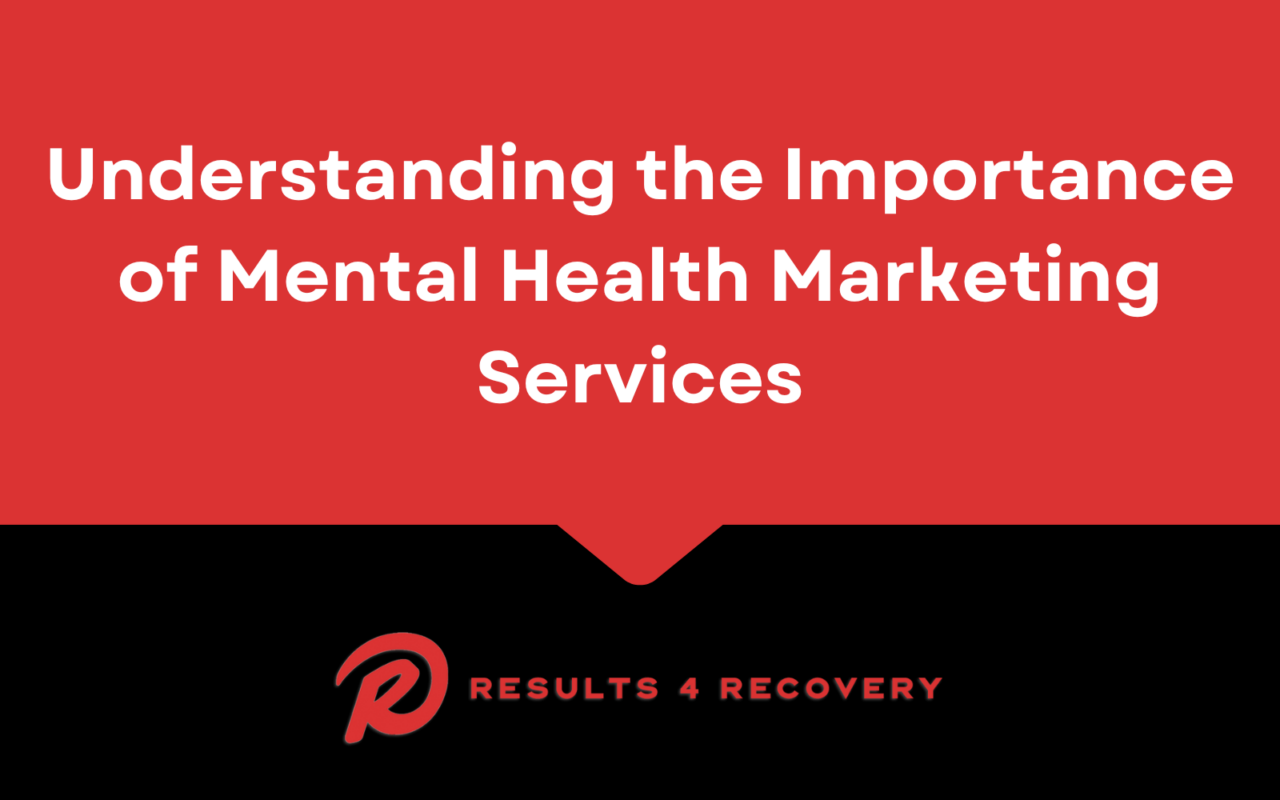In the past decade, we’ve seen a massive shift toward online engagement for everything from shopping and entertainment to seeking medical advice. One industry that has increasingly relied on the digital space is mental health care. Whether it’s individuals looking for coping strategies for anxiety or seeking specialized therapy for addiction recovery, many begin their search online. In today’s fast-paced and increasingly digital world, mental health providers need to adapt. That’s where Mental Health Marketing Services come into play. These specialized services don’t just help increase visibility but also create a bridge between those seeking help and the professionals offering it.
At Results 4 Recovery, we understand that marketing mental health services comes with unique challenges and immense responsibilities. Unlike other industries, mental health marketing requires a delicate approach that emphasizes empathy, accessibility, and trust. This article will dive into the importance of mental health marketing, how it works, and why it’s more critical than ever in today’s digital age.
The Growing Demand for Mental Health Support
The global conversation around mental health has shifted significantly over the last few years. No longer a taboo subject, people are more open than ever to discussing their mental health struggles. However, while the conversation is more visible, access to care can still be elusive for many.
The Numbers Speak Volumes
- According to the World Health Organization (WHO), depression is now one of the leading causes of disability worldwide.
- In the United States alone, over 51 million adults live with a mental illness, according to the National Alliance on Mental Illness (NAMI).
- The CDC reports that over 19% of U.S. adults had received some form of mental health treatment in the past year.
The sheer scale of the need for mental health services has skyrocketed, especially following the global COVID-19 pandemic, which exacerbated stress, anxiety, and depression across various demographics. As demand rises, so does the competition among mental health providers for visibility. This is where Mental Health Marketing Services prove invaluable.
What Exactly Are Mental Health Marketing Services?
At its core, Mental Health Marketing Services involve crafting a strategic plan to help mental health providers, therapists, rehab centers, and wellness clinics reach the people who need their services the most. It involves using a variety of digital marketing tools—such as SEO, paid advertising, content marketing, and social media strategies—to ensure that your services are discoverable, accessible, and trustworthy to your audience.
But here’s the thing: marketing mental health services isn’t like marketing a new gadget or clothing brand. You’re speaking to an audience that may be in crisis, looking for help, or navigating sensitive issues. Marketing in this space requires empathy and deep understanding.
At Results 4 Recovery, we combine Mental Health Marketing Services with a compassionate approach. We build marketing strategies that don’t just aim to increase traffic but, more importantly, build connections with those who are vulnerable and searching for help.
The Role of Digital Marketing in Mental Health Care
Let’s face it: We live in a time where our first instinct is to search online when we’re looking for solutions. Whether it’s finding a new recipe or a local therapist, the internet is our go-to resource. Therefore, the mental health industry must have a strong online presence.
Why Is Digital Marketing Crucial for Mental Health?
There are several reasons why Mental Health Marketing Services are critical for today’s mental health professionals:
- Search Behavior: When someone struggles with mental health, they often turn to Google before taking any other action. If your website doesn’t appear in search results, potential clients may never know you exist.
- Education and Awareness: Marketing goes beyond just offering a service. Effective digital marketing educates potential clients about their conditions and available treatments. Content marketing, such as blog posts or educational videos, can provide valuable information while positioning your practice as a trusted authority.
- Convenience: Mental health services, especially post-pandemic, have increasingly moved toward telehealth and virtual consultations. Marketing services can guide potential clients toward online options and make mental health care more accessible from the comfort of their homes.
- Fighting Stigma: By promoting mental health services online, we help combat the stigma that still surrounds mental health treatment. It’s essential to make these services visible, normalized, and easy to access.
Channels Used in Mental Health Marketing
Marketing mental health services in today’s digital world requires the use of multiple platforms and strategies, including:
- Search Engine Optimization (SEO): To ensure your mental health services show up when someone searches for “therapy for anxiety” or “rehab centers near me,” SEO is essential. By optimizing your website with the right keywords, like “Mental Health Marketing Services,” you increase the chances of appearing in search results when someone is looking for help.
- Pay-Per-Click Advertising (PPC): PPC ads allow you to target specific demographics. These ads can appear at the top of search engine results or within social media platforms, ensuring that your services are seen by the people who are actively searching for help.
- Content Marketing: Engaging, informative content helps build trust. By providing valuable information through blog posts, videos, or infographics, you educate your audience and give them confidence in your services.
- Social Media: Platforms like Facebook, Instagram, and even TikTok are great ways to engage with your audience. Mental health professionals can use social media to share tips, promote self-care, or even bust myths about mental health, creating a supportive online community.
Challenges of Marketing Mental Health Services
While the benefits of Mental Health Marketing Services are clear, it’s not without its challenges. Marketing in this space requires sensitivity, caution, and the ability to build genuine trust.
1. Sensitivity and Compassion
As mentioned earlier, marketing mental health services isn’t like selling products. The people you’re trying to reach might be experiencing severe depression, anxiety, or addiction. Approaching them with the wrong message can feel invasive or disingenuous. It’s crucial to create marketing campaigns that are compassionate and non-judgmental.
At Results 4 Recovery, we place a strong emphasis on understanding the emotional and mental state of your audience. This ensures that the messaging is not just helpful but also compassionate and understanding.
2. Avoiding Stigmatization
One of the biggest hurdles in mental health marketing is navigating the fine line between offering help and reinforcing stigma. Many people already feel ashamed or embarrassed about their mental health struggles. Marketing campaigns need to reduce stigma, not feed into it. Using inclusive language, focusing on solutions, and promoting self-care are just a few ways we help our clients fight stigma.
3. Data Privacy and Ethical Marketing
Another challenge in mental health marketing is the ethical use of data. People looking for mental health services are sharing sensitive information. It’s critical to ensure that their privacy is respected and protected at every stage of the marketing journey. Additionally, ethical advertising practices are vital—mental health services should never come across as predatory or exploitative.
Results 4 Recovery is committed to data privacy and ethical marketing. We follow the best practices and ensure our clients’ marketing strategies are both effective and respectful of the privacy needs of their audience.

Strategies That Work: How to Effectively Market Mental Health Services
Now that we’ve covered why mental health marketing is important and the challenges that come with it, let’s explore some effective strategies for marketing mental health services.
1. Leverage SEO to Increase Visibility
As a mental health provider, you need to ensure that people can find you easily online. Mental Health Marketing Services use SEO to rank your website higher in search results. Start by identifying the right keywords that your potential clients are using. For instance, common search terms may include “mental health services,” “therapy for depression,” “addiction recovery,” and of course, “Mental Health Marketing Services.”
At Results 4 Recovery, we don’t just stuff keywords into your content. Instead, we optimize your website’s structure, ensure that your content answers common questions, and employ best practices for on-page and off-page SEO. We also focus on local SEO so that people searching for services in your area can easily find you.
2. Use PPC Ads for Quick Results
SEO is a long-term strategy, but if you want quick results, pay-per-click (PPC) advertising is a must. PPC ads can be highly targeted based on location, demographics, and even search intent. This is particularly useful for mental health providers who want to ensure their ads are shown to people who are actively looking for help.
Our team at Results 4 Recovery sets up, manages, and optimizes PPC campaigns to deliver the best results for our clients. We ensure that every dollar you spend on advertising is used effectively to attract the right audience.
3. Create a Content-Driven Approach
Content is the backbone of any successful digital marketing strategy. In the realm of mental health, it’s especially important because it helps build trust. Articles, blog posts, videos, and other forms of content can provide valuable information to those in need.
Imagine someone searching for help with anxiety. They find a blog post on your website titled “5 Ways to Cope with Anxiety.” That blog not only provides them with immediate help but also positions your practice as a knowledgeable, trustworthy resource. If they decide they need professional support, they’re much more likely to reach out to your practice.
At Results 4 Recovery, we help create a content marketing strategy tailored to your services and audience. Whether it’s regular blog posts, e-books, or informative videos, we make sure your content speaks directly to the needs of your potential clients.
4. Engage on Social Media
People often turn to social media for support, inspiration, and guidance. Mental health providers who engage with their audience on platforms like Facebook or Instagram have a unique opportunity to build community and raise awareness. Sharing mental health tips, live Q&A sessions, or motivational stories can be incredibly impactful.
At Results 4 Recovery, we manage social media campaigns that increase engagement and foster community. We help you connect with your audience on a deeper level while promoting your services in a subtle, supportive way.
Mental Health Marketing Services: Making a Real Difference
Ultimately, Mental Health Marketing Services encompass far more than just the goals of generating leads or increasing website traffic. They are fundamentally about making a real, tangible difference in the lives of individuals who are struggling with mental health challenges. In a world where many people face stigma or feel isolated, reaching out through various digital platforms presents a vital opportunity for mental health providers to connect with individuals who may not otherwise seek help.
At Results 4 Recovery, we fervently believe in the transformative power of marketing to create meaningful change. Each successful marketing campaign not only raises awareness but also ensures that more people discover and access the support they need. This could involve guiding someone to their first therapy session, offering valuable resources that empower individuals, or assisting a family in finding a rehabilitation center for a loved one who is in need. The impact of these efforts is undeniable; by fostering connections and providing information, we contribute to breaking down barriers to care and enhancing mental well-being across communities. In essence, our mission is to not just promote services but to facilitate healing and hope for those who need it most.
Final Thoughts
The digital world has become an integral part of how we seek and access care, making Mental Health Marketing Services an absolute necessity in today’s landscape. From breaking down the stigma surrounding mental health to ensuring people know their options, marketing plays a pivotal role in connecting people with the help they need.
At Results 4 Recovery, we understand the intricacies involved in marketing for mental health services. We combine data-driven strategies with a compassionate approach, ensuring that your services reach the right audience. Together, we can reduce the barriers to mental health care and help more individuals find the support they need. Visit our website https://results4recovery.com/ for more information!


